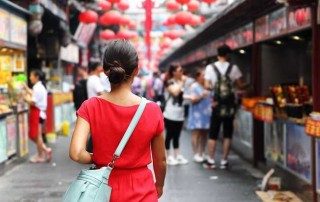3 Top Tips on How to Haggle Like a Pro in China
How to master haggling in China?
Written by Juliette Pitt
I’m sure if you’ve been to China, you would have experienced haggling. Haggling is part of Chinese culture and like any great skill you might need some practice before you can master the art of it!
So here are three top tips to help you haggle in markets or small shops when you’re in China.

#Tip 1: Know where to haggle
Locations such as Beijing’s Silk Market or Shanghai’s Yatai Xinyang market or AP plaza are the perfect places to haggle. In these types of markets, it is appropriate to haggle as they tend to charge rather unnecessary high prices especially if you are a tourist. Indeed, vendors themselves expect tourists to haggle. But, if the shop/cafe is well-established such as Pandora or Starbucks it is not appropriate to haggle as they have a set price that probably can’t be reduced. Also, haggling in restaurants is also rare, but if you are in a street food market, then could it be worth a try.
#Tip 2: Be prepared
Before going to the market to haggle for an item, make sure you have a rough idea on the price of the item you wish to purchase so you are not taken for a ride! As the vendors tend to charge higher prices for a foreigner, you have to decide how much you’re willing to spend. It’s also advisable to break down your money into smaller change, so if you have managed to haggle an item to 10 RMB, it might be seen as offensive to the seller if you hand over a 100 RMB note.
#Tip 3: Speak some Chinese
If you speak some Chinese, this is the perfect way to put it into practice! This gives you a huge advantage, as it will impress the vendor. Here are some good sentences/phrases to use:
- How much does this one cost?
- 这个多少钱?(zhège duōshǎo qián?)
- It’s too expensive
- 太贵了 (tài guìle)
- A bit cheaper
- 便宜一点 (piányí yīdiǎn)
- This product is cheaper in that shop over there
- 这个产品在那边的商店比较便宜(zhège chǎnpǐn zài nà biān de shāngdiàn bǐjiào piányí)
- Its ok
- 没关系
- Forget it,
- 那算了
- Bye-bye
- 拜拜
It’s common for market stalls to have a calculator that makes it easy for both you to pass back and forth to type in the prices. Though you can use Chinese numbers, if they speak too fast, it’s better to use their calculator.
Don’t be shy or hesitate to speak some Chinese – it’s best to be bold with the shopkeeper as there is a high chance, they are selling you something that is too expensive! A good technique if you are in a particular large market is to compare the vendor’s shop to his competitors. In these types of markets, it is easy to find approximately the same thing in a different stall.
Don’t hesitate to pretend you’ve been to the other shops already as they always want to make a sale. But if the vendor is not lowering their price, its best just to walk away. By walking away, they might give in to the price you offered, and, in this instance, you can be pleased with your haggling performance.
#Finally…
A lot with haggling is about acting and false pretenses. Our best advice is to select an item you want and then either ask a price or state your first offer. It’s best not to make your first offer what you intend to pay. Start lower and then, you and the vendor can negotiate a suitable price that meets somewhere in the middle. Don’t feel guilty about asking for a cheaper price as shopkeepers will never sell at a loss but also be reasonable. For example, it would be inappropriate to ask for 50 yuan if the original price was 1000 yuan!
#Good luck!
Don’t get disheartened if your first experience in haggling doesn’t quite go exactly to plan, there’s always going to be another chance. If you are traveling in a group – its best to go with a group of friends as going alone for your first time can be quite daunting! Have you ever haggled before? Let us know your tips and experiences by commenting down below, we’d love to hear!